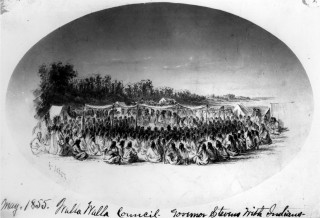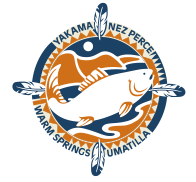Since time immemorial, the health, spirit, and cultures of the Columbia River tribes have been sustained by the water, salmon, game, roots, and berries of our homeland— our sacred “First Foods.” When the Yakama, Umatilla, Warm Springs and Nez Perce tribes entered into treaties with the United States in 1855, they specifically reserved their rights to fish, hunt, and gather at all usual and accustomed areas. The treaties have not only protected these rights, they have provided crucial legal leverage helping drive current salmon recovery efforts.
 Since the signing of the treaties, the Columbia Basin has been dramatically altered. Increased human population, dam construction, unregulated harvest, and substantial habitat modifications drastically reduced salmon populations. The significant decline drove the four tribes to form the Columbia River Inter-Tribal Fish Commission in 1977. Since then, these tribes have become leaders in “putting fish back in the rivers and protecting the watersheds where fish live.” They participate in interstate agreements and international treaties controlling salmon harvest and water management; they are successfully rebuilding naturally spawning salmon populations, and they are restoring habitat and protecting the water flowing in the rivers.
Since the signing of the treaties, the Columbia Basin has been dramatically altered. Increased human population, dam construction, unregulated harvest, and substantial habitat modifications drastically reduced salmon populations. The significant decline drove the four tribes to form the Columbia River Inter-Tribal Fish Commission in 1977. Since then, these tribes have become leaders in “putting fish back in the rivers and protecting the watersheds where fish live.” They participate in interstate agreements and international treaties controlling salmon harvest and water management; they are successfully rebuilding naturally spawning salmon populations, and they are restoring habitat and protecting the water flowing in the rivers.
Despite many daunting challenges, the tribes never strayed from their mission to protect salmon. Remarkably, the salmon decline has been reversed, in large part to the legal leverage of the treaty-reserved fishing right and the value of partnership. Our work has only begun, but the success of our efforts will benefit future generations, tribal and non-tribal alike.
